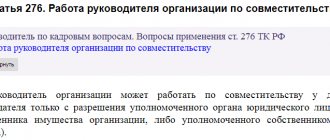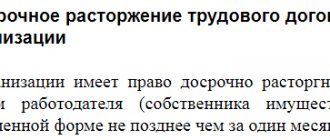Termination of an employment contract with the head of the organization
Rules for using services and information
users of the electronic services system “Onlineinspection.rf”
The rules for the use of services and information by users (hereinafter referred to as the Rules) of the system of electronic services “Onlineinspektsiya.rf” (hereinafter referred to as the System) apply to all electronic services of the System, without exception, accessed through sections and pages of the Internet portal https://onlineinspektsiya. RF (hereinafter referred to as the Portal). These Rules govern the behavior of all, without exception, registered users in the System and unregistered visitors to the Portal.
1. Terms and concepts used in these Rules
1.1 These Rules use the following terms and concepts:
System – system of electronic services “Onlineinspektsiya.rf”.
Services are basic and additional tools offered to the User for interaction with authorities.
The portal is an information resource created for the purpose of interaction of citizens with the System, located on the Internet at the address: https://onlineinspektsiya.rf.
The portal administration is officials of the Federal Service for Labor and Employment and representatives of the contractor under the state contract for the provision of technical support of the Portal, who carry out the operational management of the Portal.
User – a person registered on the Portal who is invited to use the services provided by the Portal.
Moderator is a representative of the portal Administration who processes user messages.
Moderation is the process of processing and analyzing the compliance of the User’s message with the provisions of these Rules for the use of services and information by users of the online services system “Onlineinspektsiya.rf” and the User Agreement.
2. General rules
2.1. To access the publication of messages on the Portal (discussions, comments, questions and use of any other means of interaction between the User and the System), each Portal User must read and agree with these Rules.
2.2. After reading the texts of the Rules of Use and the User Agreement, confirming agreement with them on the registration page or sending a message, each User, by these actions, enters into an agreement with the Portal Administration to regulate their relationship.
2.3. The Portal Administration has the right to carry out moderation through representatives of the Portal Administration - moderators.
2.4. These Rules may be amended by amending the relevant order of the Federal Service for Labor and Employment.
3. User registration
3.1. The Portal has a user registration system. Only registered users have the opportunity to interact interactively with the System services.
3.2. To register on the Portal, the User specifies a valid email address - notifications about the current status of published messages (appeals) will be sent to it, and selects a conditional User name (“nickname”).
3.3. When registering a User, the System requests a password for the login being registered. This password must be known only to the User and must not be disclosed to third parties. The password used can be changed by the User in a special section of the Portal – User Profile.
3.4. When registering a User, the System initiates the authorization process by sending an SMS message with an activation code to the User’s phone number specified during registration. The received password must be entered in a special field in the window that opens. Only after entering the password will the account be activated.
3.5. For users who have an account on the Public Services Portal (https://www.gosuslugi.ru/), the opportunity to authorize using the login and password for this account is provided. If registration is carried out using this method, verification via SMS message is excluded.
4. Publication of appeals
4.1. Each registered User can publish an appeal.
4.2. Appeals are published in accordance with the proposed classifier of problem categories.
4.3. To create a request, you must fill out the request form. In the application form, the User must indicate his real data.
4.4. The user must fill in the following fields about himself as an applicant:
— the applicant’s residential address;
— last name, first name, patronymic (if any) of the applicant;
— the applicant’s mobile phone number (if there is no mobile phone required when registering in the System, the applicant has the right to submit an application directly to the email address of the territorial body of Rostrud. The list of territorial bodies of Rostrud is posted on the unified information portal of the Federal Service for Labor and Employment on the Internet "(https://rostrud.ru/). If the User has not previously registered on the Portal, an activation code will be sent to this specified phone number, which must be entered in a special field in the window that appears in order to activate the User’s account and contact him ;
— email address to which notifications about the progress of solving the problem will be sent.
The Portal Administration ensures non-disclosure to third parties of all user data entered during the registration process, except for cases stipulated by the User Agreement.
4.5. The user must fill in the following fields about the place of work:
- region, city and exact actual address of the organization of which he is an employee;
— information about the organization: name, legal form, legal address, information about the director;
— information about your position and period of work;
— information about third parties whose mention is required to fully describe the problem.
4.6. The user needs to fill in the following fields about his problem:
— explanations of the current situation;
— photographic materials.
Information entered in the “Explanation of the current situation” field becomes public and should be of a general nature. In this field it is prohibited to mention the personal data of third parties. If the applicant violates this paragraph of the rules, the User himself is responsible for the publication of information.
Photographic materials are classified information by default and can be published publicly at the discretion of the User.
4.7. Before sending the application, the User agrees with these Rules for the use of services and information by System users and accepts the agreement on the processing of personal data. In case of disagreement with these conditions, each User has the right to refuse to use the resource and use other types of communication offered on the official resources of the department.
4.8. The Portal uses post-moderation of messages. Messages are published immediately after they are posted by users and, if they violate these Rules, they are deleted, or the moderator sends a letter to the User with a request to eliminate the violation.
4.9. Reasons for refusal to publish a message or proposal to make adjustments:
- ignoring spelling rules and profanity, the message is not written in the state language of the Russian Federation or contains a large number of spelling and syntax errors, is written in capital letters, contains profanity, including in a veiled form;
- the lack of a logical connection between the sentences in the address, which does not allow one to understand the general meaning of the described case;
— extremism, discrimination (in all forms: racial, ethnic, age, gender, religious, social, etc.);
- commercial purposes and advertising - if, in the opinion of the moderator, the published information is directly or indirectly aimed at making a profit;
- insufficient description or unfounded accusations - the moderator reserves the right to reject a case if the information specified in it does not allow us to draw a conclusion about an existing offense;
— cases in which there is no specific indication of the problem and there are questions of a rhetorical nature are not moderated;
— cases that do not correspond to the category chosen by the User are not moderated;
— messages that duplicate previously published messages are not moderated (the text of the message completely repeats the text of the previous message, that is, it does not contain new information).
4.10. The user can familiarize himself with the response to the published appeal in his personal account, having previously completed authorization on the Portal.
Thank you for your attention and understanding!
Dismissal of the chief accountant during reorganization by merger
Yulia, in accordance with the Labor Code of the Russian Federation (Article 75), a change in the jurisdiction (subordination) of an organization or its reorganization (merger, annexation, division, spin-off, transformation) or a change in the type of state or municipal institution cannot be grounds for termination of employment contracts with employees of the organization or institutions.
I have been working as a chief accountant in the company for 8 years, since its inception. The organization began the process of reorganization through a merger with a Moscow company. The reorganization period is two months. A notice was presented that in 2 months the salary would be reduced by 30%. Then the chief accountant will be offered the position of office manager with a low salary. Thus, the employer leads to dismissal at his own request without any compensation. Is this legal? Can I count on dismissal under Art. 181 of the Labor Code of the Russian Federation, upon dismissal, the manager, his deputy, or the chief accountant are paid monetary compensation in the amount of at least three monthly average earnings. Is the specific amount of compensation determined by agreement of the parties? And what reasons/statements can I give for this compensation to be paid to me? Thank you in advance. Best regards, Yulia
We recommend reading: Is It Possible to Build a House on Earth to Run a Personal Farm 2019
Dismissal during manager reorganization
During the merger, some positions may become redundant. Working conditions and employment contracts may change; sometimes, when the owner changes, the question of partial dismissal of staff and the hiring of new employees may arise. All these activities must be carried out strictly in accordance with the laws (Articles 75, 77, 81, 178 and 180 of the Labor Code of the Russian Federation).
We recommend reading: Notary inheritance cases by last name
The advantage always remains on the side of more qualified, experienced staff with high productivity. This rule applies to all matching positions. Under equal conditions, the chances of being laid off are less for employees who have dependent relatives, disabled combat veterans, and employees who improve their skills by order of the director. Additional information is specified in the collective agreement. By law it is prohibited to reduce:
Dismissal of the CEO: what to pay attention to
The general director was elected for four years, a fixed-term employment contract was concluded with him, which ends in 2021. The founders do not initiate meetings, they talk about doing nothing and the fixed-term contract will automatically become indefinite. What does this mean? And how to prove that it is necessary to terminate the current one and enter into a new employment contract? The director himself does not want to initiate the election.
The term of office of the sole executive body of an LLC or JSC (director, manager) may be unlimited or no more than five years. This must be indicated in the charter (Article 40 of the Federal Law of 02/08/1998 N 14-FZ, paragraph 3 of Article 69 of the Federal Law of 12/26/1995 N 208-FZ).
Also, the period must be specified in the employment contract (Articles 57 - 59, 275 of the Labor Code of the Russian Federation).
According to judicial practice, the expiration of a director’s term of office does not mean the termination of his powers if there is no decision to appoint a new one (for example, Resolution of the Arbitration Court of the North-Western District of August 23, 2018 N F07-8947/2018 in case N A56-50010/2017). If a fixed-term employment contract has expired and the employee continues to work, such a contract is considered concluded for an indefinite period (Article 58 of the Labor Code of the Russian Federation).
Despite this, it is necessary to hold a meeting of the founders to elect a leader for a new term within the established time frame, because otherwise, there may be problems of a corporate nature when implementing relationships with banks, counterparties, government agencies, as well as other risks.
In this case, it is also necessary to check the organization’s charter for the presence of any civil consequences after the expiration of the period for which the person was elected to the position (for example, Resolution of the Arbitration Court of the Volga District dated March 15, 2019 N F06-43151/2019 in case N A65 -24603/2018).
Since the charter specifies the term of office, then, in our opinion, the employment contract should be concluded for the period specified in the charter and terminated at the end of its validity. Labor legislation does not provide for the possibility of re-registration and extension of employment contracts (see, for example, Letter of Rostrud dated December 8, 2008 N 2742-6-1).
Rostrud also has an opinion: it is possible to extend the term of an employment contract with the help of an additional agreement, provided that the basis on which the fixed-term employment contract was concluded is preserved (not changed) (Report ... for the third quarter of 2021). But if the period exceeds 5 years, claims from regulatory authorities, as well as disputes with the employee, are possible.
The risk of extending a fixed-term employment contract or the lack of agreement between the parties on the term of the employment contract lies for the employer in the following:
- is that such an agreement can be recognized as concluded for an indefinite period, and the dismissal of an employee after the expiration of the contract can be considered illegal with the subsequent reinstatement of the employee (for example, Resolution of the Supreme Court of the Russian Federation dated November 6, 2019 in case No. 2-3084/ 2019; dated August 27, 2018 N 11-11112/2018);
- in bringing the employer to justice under Part 1 or Part 4 of Art. 5.27 of the Code of Administrative Offenses of the Russian Federation (for example, Appeal rulings of the Supreme Court of the Udmurt Republic dated September 18, 2019 N 33-4385/2019);
- and finally, possible problems when carrying out legally significant actions by the director.
Therefore, be careful.





